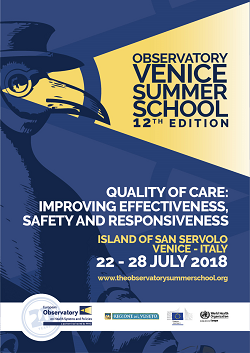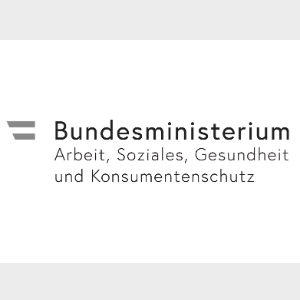Observatory Venice Summer School 2018

22-28 July 2018, San Servolo, Venice, Italy
What: “Quality of care: Improving effectiveness, safety, and responsiveness”
The Observatory Venice Summer School 2018 is a short, intensive course. It is a week of learning, interacting, studying, debating, and sharing experiences with other policy makers, planners and professionals to understand, discuss and improve quality-of-care strategies and policies.
When: 22-28 July 2018
Who: The course is aimed at senior and mid level policy makers, civil servants and professionals.
If you are involved in steering health care services or are looking at measuring, assuring or improving quality of care at international, national or regional level – then the Observatory Venice Summer School is for you.
Objectives: To
- Understand the underlying concept of ‘quality of care’ and its various dimensions as well as ways to measure and compare quality
- Provide evidence-based country experiences of different approaches and innovative models of assuring and improving care
- Systematize and interpret the effectiveness of quality of care approaches such as evidence-based pathways, accreditation, audit and feedback, patient safety measures, public reporting or pay-for-quality
- Review how such approaches can be combined into national strategies to enable that health systems fulfil their roles and continuously improve their performance
Why quality of care?
Most stakeholders and policy-makers believe they are working to improve the quality of care. However, when different stakeholders talk about quality they mean different things. What’s more, there are different strategies that may help to improve quality in a range of care settings – each with different challenges. Unsurprisingly, there is an ongoing and sometimes fierce debate about what quality means and how best to improve it. The Observatory Venice Summer School 2018 will help senior and mid-level policy makers, civil servants, health professionals and patient group representatives to explore concepts and strategies that will help them assure and improve quality of care from different perspectives on services as well as whole system level. The most important topics covered by the one-week intensive course include:
- What is ‘quality of care’? How do different organisations define quality? What are the different dimensions of quality?
- How can quality of care be measured? What indicators exist to track performance on different dimensions of quality? What data sources are available and/or needed?
- What are the key approaches to assure and improve quality of care? What are the characteristics of different approaches? What do we know about their (comparative) effectiveness? What are possible unintended consequences? When to use which strategy?
- What are future trends, key challenges, and policy options towards improving quality of care in different health systems?
- How can the most fitting components for a quality strategy in a given national context be identified and implemented?
Approach
The six day course includes formal teaching but has at its core the experiences of participants in practice. A highly participative approach emphasizes group work that cuts across themes, participant presentations, round tables and panel discussions. It mobilizes the latest evidence and a multidisciplinary team of experts with a track record in the analysis, implementation and evaluation of defining, measuring and improving quality of care. Course participants will also be able to share perspectives with and gain insights from key international organizations including the European Commission, OECD and WHO as well as relevant professional and governmental organizations and to engage in political dialogue with senior policy makers. They will be part of the Summer School tradition, which fosters evidence-based policy-making and encourages European health policy debate by raising key issues, sharing learning and building lasting networks.
For further information about the Observatory Venice Summer School 2018, including the modules and application, please visit the Observatory Summer School website.





















